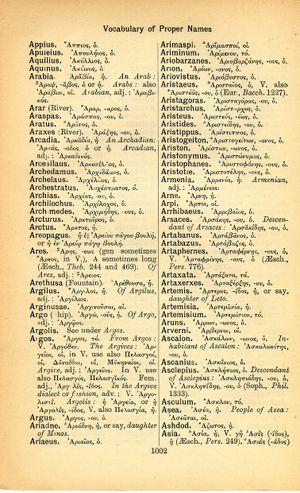Ariminum
κινδυνεύει μὲν γὰρ ἡμῶν οὐδέτερος οὐδὲν καλὸν κἀγαθὸν εἰδέναι, ἀλλ᾽ οὗτος μὲν οἴεταί τι εἰδέναι οὐκ εἰδώς, ἐγὼ δέ, ὥσπερ οὖν οὐκ οἶδα, οὐδὲ οἴομαι· ἔοικα γοῦν τούτου γε σμικρῷ τινι αὐτῷ τούτῳ σοφώτερος εἶναι, ὅτι ἃ μὴ οἶδα οὐδὲ οἴομαι εἰδέναι. → for neither of us appears to know anything great and good; but he fancies he knows something, although he knows nothing; whereas I, as I do not know anything, so I do not fancy I do. In this trifling particular, then, I appear to be wiser than he, because I do not fancy I know what I do not know.
English > Greek (Woodhouse)
Ἀρίμενον, τό.
Latin > English (Lewis & Short)
Ărīmĭnum: i, n.,
I a town in Umbria, on the shore of the Adriatic, at the mouth of a river of the same name; the most northern place of Italy proper, connected with Rome by the Via Flaminia, now Rimini, Plin. 3, 15, 20, § 115; Luc. 1, 231; cf. Mann. Ital. I. 455.—Hence, Ărīmĭnensis, e, adj., pertaining to Ariminum: folia, Hor. Epod. 5, 42: ager, Plin. 10, 21, 25, § 50; subst.: Ărīmĭnenses, ium, m., the inhabitants of Ariminum, Cic. Verr. 2, 1, 14; id. Caecin. 35, 112.
Latin > French (Gaffiot 2016)
Ărīmĭnum,¹² ī, n., Ariminum [ville de l’Ombrie] : Cic. Fam. 16, 5, 2 ; Liv. 21, 51, 7, etc. || -ēnsis, e, d’Ariminum : Plin. 10, 50 et -ēnsēs, habitants d’Ariminum : Cic. Cæc. 102.
Latin > German (Georges)
Arīminum, ī, n., Stadt u. gleichn. Fluß in Umbrien, von den Römern kolonisiert, j. Rimini, Fl. Marcochia, Caes. b. c. 1, 8, 1. Vell. 1, 14, 7. Sulp. Sev. 2, 41, 1 u. 45, 8. – Dav. Arīminēnsis, e, zu Ariminum gehörig, ariminensisch, Folia, Hor.: ager, Plin.: synodus, Sulp. Sev.: Plur. subst., Arīminēnsēs, ium, m., die Einw. von Ar., die Ariminenser, Cic.

